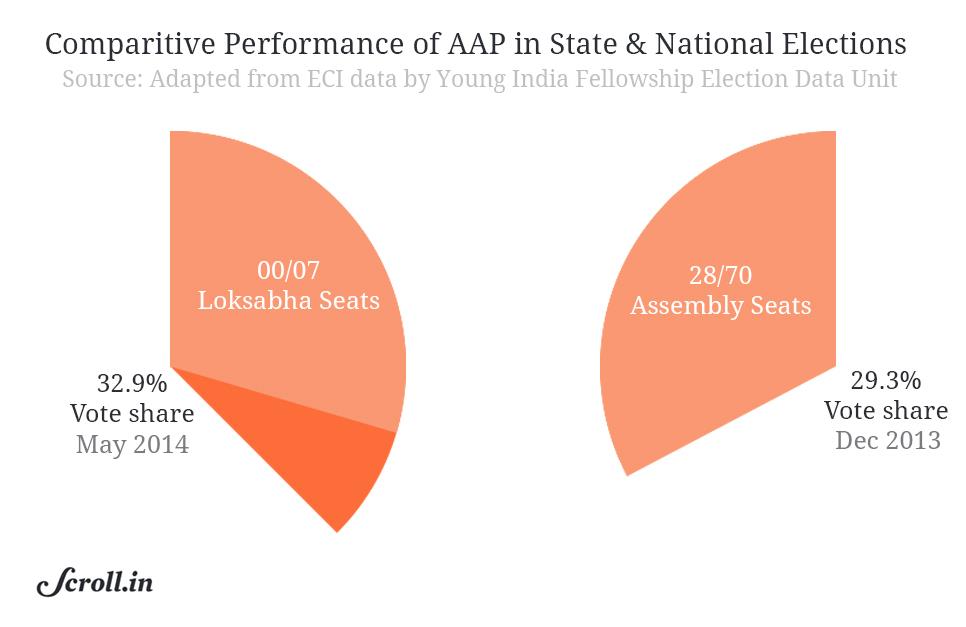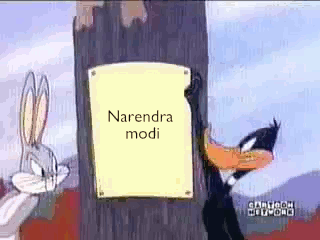So Kejriwal started writing letters to Modi, began referring to corrupt BJP leaders in his speeches and eventually decided to directly fight Modi in the Lok Sabha elections in Varanasi. Meanwhile, the BJP stubbornly refused to take on AAP, which had actually helped the saffron party's anti-Congress cause by highlighting the corruption allegations of the final years of the United Progressive Alliance. Instead, particularly in Delhi, BJP leaders kept talking about how it was a three-way contest, and that one could never rule out a grand old party like the Congress.
The BJP's idea was simple: It wouldn't allow the new kid to usurp its platform of change, while also hoping that the anti-BJP vote, mostly of minorities, would be split between the Congress and AAP.

That didn’t quite work. The saffron party did take home all seven Lok Sabha seats in the capital, with a comfortable margin, but the Congress share of the vote declined even further, and the AAP came second in every seat. Despite AAP’s internal problems and struggle to stay relevant, it was apparent then and still is today that it is the only other contender in the Delhi electoral battle.
This couldn’t have been clearer than on Saturday, when Modi, giving a speech in the capital’s historic Ramlila Maidan, devoted half of his time to attacking AAP and Kejriwal. Even though he didn’t mention Kejriwal by name once, Modi went so far as to compare Kejriwal’s party to left-wing Naxalites.
“We need development here, not anarchy,” Modi said. “They are good at dharnas. We are good at running government.”
Pick your battles
As if to underscore the precipitous decline of the Congress in the last year, the Indian Express made an analysis of the number of times Modi referred to the party that had ruled Delhi for 15 years during a speech in the last assembly polls and this one. In November 2013, Modi referred to the Congress 56 times in a 37-minute long speech. This time around, in a speech almost the same length, he only spoke about them 5 times.
What’s going on here? Although some BJP leaders are still trying to resurrect the Congress, a much easier punching bag for them, the prime minister has made it clear that the chief enemy is Kejriwal and AAP.
What’s even clearer is the demographic that the two are battling over: the urban poor. Modi’s mentions of the poor went from twice in the speech in 2013, to 33 times in Saturday’s speech. He also sought to undercut the AAP’s “aam” image, by pointing out that all of the BJP chief ministers who have just taken charge of Maharashtra, Haryana and Jharkhand come from humble backgrounds (not to mention, of course, Modi’s own modest beginnings).
King Cong gone

vviikkrraanntt/reddit
To Modi, it is clear that the Congress is not going to be a useful vote-splitter, as, say, the Bahujan Samaj was in Uttar Pradesh. There are even indications, voiced with annoyance by the BJP, that the Congress is aware of this and will effectively stand by and let Kejriwal take the lead in the capital.
The risk to Modi is evident. Although it seems like there’s little chance that the BJP will fail to garner a majority, AAP has been working relentlessly to reach out to Delhi’s residents, particularly the poor, who are always the first to be affected by inflation, housing issues and power problems. This is why the Cabinet issued an ordinance that made it much easier for colonies to be regularised and why Modi vowed to provide the city with uninterrupted power, before tackling the issue of electricity bills, Kejriwal’s pet issue.
If, despite all this, AAP manages to embarrass the BJP under the prime minister’’s own nose in the capital, it would count as a serious setback to the new government as forces around the country try to figure out a way to attack the phenomenon that is Modi.










